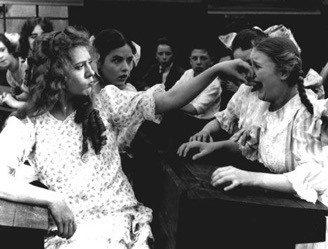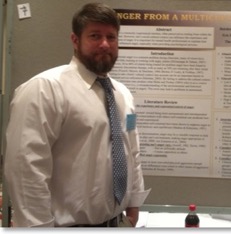
Director: Eric R. Dahlen, Ph.D.
Careless Responding in Online Survey Research
11/13/14 Research Methods
Much of our recent research on relational aggression has utilized college student samples and has involved online surveys. Based on published recommendations (e.g., Huang, Curran, Keeney, Poposki, & DeShon, 2011; Liu, Bowling, Huang, & Kent, 2013; Meade & Craig, 2012), we have been incorporating various methods of detecting careless responding in our surveys. What we have found is that a substantial number of research participants are responding carelessly. In the interest of data integrity, it is clear that the use of procedures to detect careless responders are essential to include in online survey research.
For those researchers just beginning to consider incorporating methods for identifying careless responders and reducing careless responding in online survey research, some of the procedures we have been using include:
We have noticed that it is becoming increasingly common for authors of studies using online surveys to address how they detected careless responders and what they did with these data. This suggests that the use of such procedures are rapidly becoming part of routine practice to promote data integrity.
For those researchers just beginning to consider incorporating methods for identifying careless responders and reducing careless responding in online survey research, some of the procedures we have been using include:
- Modifying consent forms and survey instructions to inform potential participants that quality assurance checks are being used and that failing such checks will result in them not receiving incentives for participation
- Including validity items or bogus items that should be answered the same way by participants who are attending to item content
- Measuring survey completion and/or individual instrument completion time
We have noticed that it is becoming increasingly common for authors of studies using online surveys to address how they detected careless responders and what they did with these data. This suggests that the use of such procedures are rapidly becoming part of routine practice to promote data integrity.
Daniel Deason Defends Master's Thesis
10/13/14 Aggression
Daniel Deason successfully defended his master's thesis today, Personality and Relational Aggression in College Students: The Role of Social Anxiety and Rejection Sensitivity. Daniel's study examined the utility of the Five Factor Model (FFM) of personality, as well as social anxiety and rejection sensitivity in predicting relational aggression in college students' peer and romantic relationships.
In examining the zero-order correlations between the FFM constructs and relational aggression, both peer and romantic relational aggression were inversely related to agreeableness, conscientiousness, and emotional stability (i.e., the inverse of neuroticism). Thus, more relationally aggressive students scored lower on agreeableness, conscientiousness, and emotional stability.
When peer relational aggression and romantic relational aggression were each regressed on the five FFM constructs, extraversion, agreeableness, and emotional stability emerged as significant predictors. Students reporting more relational aggression tended to be more extraverted, less agreeable, and have lower emotional stability.
Based on the literature, the strongest case could be made for the role of agreeableness and emotional stability. So, sequential regressions designed to take student gender and race into account were conducted. Agreeableness and emotional stability predicted peer relational aggression; emotional stability predicted romantic relational aggression.
Finally, the incremental validity of social anxiety and rejection sensitivity was tested over and above participant gender, race, and the full FFM. Social anxiety but not rejection sensitivity demonstrated evidence of incremental validity here. Interestingly, extraversion joined agreeableness and emotional stability as predictors of both peer and romantic relational aggression, suggesting that this variable may be more relevant than was previously thought.
Additional analyses will be needed to better evaluate the potential role of participant gender and race, so we will be sure to share them here once they are completed.
In examining the zero-order correlations between the FFM constructs and relational aggression, both peer and romantic relational aggression were inversely related to agreeableness, conscientiousness, and emotional stability (i.e., the inverse of neuroticism). Thus, more relationally aggressive students scored lower on agreeableness, conscientiousness, and emotional stability.
When peer relational aggression and romantic relational aggression were each regressed on the five FFM constructs, extraversion, agreeableness, and emotional stability emerged as significant predictors. Students reporting more relational aggression tended to be more extraverted, less agreeable, and have lower emotional stability.
Based on the literature, the strongest case could be made for the role of agreeableness and emotional stability. So, sequential regressions designed to take student gender and race into account were conducted. Agreeableness and emotional stability predicted peer relational aggression; emotional stability predicted romantic relational aggression.
Finally, the incremental validity of social anxiety and rejection sensitivity was tested over and above participant gender, race, and the full FFM. Social anxiety but not rejection sensitivity demonstrated evidence of incremental validity here. Interestingly, extraversion joined agreeableness and emotional stability as predictors of both peer and romantic relational aggression, suggesting that this variable may be more relevant than was previously thought.
Additional analyses will be needed to better evaluate the potential role of participant gender and race, so we will be sure to share them here once they are completed.
Dark Personalities and Relational Aggression
09/19/14 Aggression
The "Dark Triad" of personality refers to narcissism, psychopathy, and Machiavellianism, three constructs with links to overt aggression and other socially undesirable behaviors. Despite the utility of these variables in understanding a variety of behaviors, relatively little is known about their potential role in relational aggression. Moreover, there may be other "dark personality" constructs not adequately represented in the Dark Triad that could be helpful in understanding relationally aggressive behaviors (e.g., sadism).
We recently started collecting data for a couple of studies examining the possible role of the Dark Triad constructs in relational aggression and how they fit into broader models of personality, such as the Five Factor Model and the HEXACO model of personality.
These studies fit our goal of learning more about relational aggression among emerging adults. In addition, it seems that the study of dark personality constructs may be beneficial in some of our other research areas (e.g., anger and traffic psychology).
We recently started collecting data for a couple of studies examining the possible role of the Dark Triad constructs in relational aggression and how they fit into broader models of personality, such as the Five Factor Model and the HEXACO model of personality.
These studies fit our goal of learning more about relational aggression among emerging adults. In addition, it seems that the study of dark personality constructs may be beneficial in some of our other research areas (e.g., anger and traffic psychology).
New Lab Space
08/29/14 About
We received some great news at the beginning of the Fall academic term. The Anger and Traffic Psychology Lab has gained access to some recently vacated lab space in our building, which we will share with Dr. Madson's College Alcohol Research Team.
This lab space should provide students with some quiet workspace, a place for graduate students to meet with undergraduate research assistants without disrupting others, and facilitate access to shared research materials. It will take some time and effort to organize the space effectively and figure out how best to use it, but it will be very helpful as we move into a busy semester with multiple projects underway and a few more about to begin.
This lab space should provide students with some quiet workspace, a place for graduate students to meet with undergraduate research assistants without disrupting others, and facilitate access to shared research materials. It will take some time and effort to organize the space effectively and figure out how best to use it, but it will be very helpful as we move into a busy semester with multiple projects underway and a few more about to begin.
Paper on Parenting and Relational Aggression Accepted for Publication
08/21/14 Aggression
Caitlin Clark, a doctoral student working in the lab, received some good news this summer. A paper based on her master's project was accepted for publication in the Journal of Aggression, Maltreatment & Trauma.
The paper, titled "The role of parenting in relational aggression and prosocial behavior among emerging adults," continues the lab's research on relational aggression in college students. Results indicated that students' retrospective ratings of how they were parented were related to both relational aggression and prosocial behavior. Authoritative parenting, permissive parenting, and parental psychological control predicted relational aggression. Authoritarian, authoritative, and permissive parenting predicted prosocial behavior, and participant race moderated the relationship between psychological control and prosocial behavior (i.e., parental psychological control was inversely related to prosocial behavior for Black students but not for White students).
The paper, titled "The role of parenting in relational aggression and prosocial behavior among emerging adults," continues the lab's research on relational aggression in college students. Results indicated that students' retrospective ratings of how they were parented were related to both relational aggression and prosocial behavior. Authoritative parenting, permissive parenting, and parental psychological control predicted relational aggression. Authoritarian, authoritative, and permissive parenting predicted prosocial behavior, and participant race moderated the relationship between psychological control and prosocial behavior (i.e., parental psychological control was inversely related to prosocial behavior for Black students but not for White students).
Niki Knight Proposes Master's Thesis
04/28/14 Aggression
Niki Knight, a doctoral student in her first year of the Counseling Psychology Program, successfully proposed her master's thesis today, The HEXACO Model of Personality and Dark Triad in Relational Aggression. She can begin data collection after obtaining IRB approval.
Niki's thesis will examine the relationships between the constructs represented by the HEXACO personality model and relational aggression in college students, focusing on the role of Honesty-Humility and Agreeableness. Additionally, she will assess the predictive utility of the Dark Triad constructs (i.e., narcissism, Machiavellianism, and psychopathy) in predicting proactive and reactive relational aggression.
Niki's thesis will examine the relationships between the constructs represented by the HEXACO personality model and relational aggression in college students, focusing on the role of Honesty-Humility and Agreeableness. Additionally, she will assess the predictive utility of the Dark Triad constructs (i.e., narcissism, Machiavellianism, and psychopathy) in predicting proactive and reactive relational aggression.
Relational Aggression in College Students
04/22/14 Aggression

Research conducted at the Anger and Traffic Psychology Lab has focused on contributing to the growing literature on relational aggression in college students. Below is a summary of three recent studies conducted at the lab.
1. Czar, Dahlen, Bullock, and Nicholson (2011) explored the potential role of psychopathic personality traits in relational aggression among college students. Both primary and secondary psychopathic traits predicted relational aggression, and these relationships did not vary by gender. This suggests that psychopathic traits (e.g., a lack of empathy or remorse, dishonesty, impulsivity, antisocial behavior), known to predict overt aggression, may also be relevant to understanding relational aggression.
2. Prather, Dahlen, Nicholson, and Bullock-Yowell (2012) found that male and female college students reported engaging in similar levels of relational aggression in their dating relationships. Students with traditional (as opposed to egalitarian) sex role attitudes were more likely to engage in dating relational aggression, regardless of gender. In addition, the acceptance of couple violence predicted dating relational aggression over and above trait anger and sex role attitudes. Taken together, the results suggest that college students who experience more frequent and intense anger than their peers, hold traditional sex role attitudes, and are more accepting of intimate partner violence are more likely to commit acts of relational aggression in their dating relationships.
3. Dahlen, Czar, Prather, and Dyess (2013) found that college students who described themselves as more relationally aggression reported higher levels of anxiety, depression, anger, loneliness, academic burnout, and the misuse of alcohol. The correlates of relational victimization were similar, suggesting that both relational aggression and victimization can be disruptive to college students' social and emotional functioning. Dahlen and colleagues (2013) also found that anxiety, trait anger, and personal problems related to alcohol use predicted relational aggression in peer relationships while taking students' gender, race, and experiences with relational victimization into account.
David Boudreaux Proposes Dissertation
04/17/14 Anger
David Boudreaux successfully proposed his dissertation yesterday. His study, Refinement of the Attitudes Toward Anger Management Scale, will attempt to confirm the factor structure of a measure he developed for his thesis, the Attitudes Toward Anger Management Scale (ATAMS), and provide additional support for the reliability and validity of the measure.
The ATAMS will be under development for some time, as David collects his data and completes his analyses. Eventually, we hope to produce a psychometrically sound measure of attitudes toward anger management that can be used to inform prevention and treatment.
The ATAMS will be under development for some time, as David collects his data and completes his analyses. Eventually, we hope to produce a psychometrically sound measure of attitudes toward anger management that can be used to inform prevention and treatment.
Students Complete Advanced Anger Management Training
03/28/14 Anger
After completing a round of basic anger management training last month focused on learning how to incorporate anger management techniques into individual counseling, several graduate students in the Counseling Psychology program at the University of Southern Mississippi continued their training today. Today's training focused on preparing students to implement Cognitive Relaxation Coping Skills (CRCS; Deffenbacher & McKay, 2000), a brief evidence-based treatment for clinically dysfunctional anger.
CRCS is a structured multicomponent treatment in which clients learn to reduce their level of anger arousal through a variety of relaxation coping skills and cognitive restructuring. It is typically delivered in an 8-12 session package.
The students who completed today's training will have the opportunity to provide CRCS to clients in the Hattiesburg community seeking help with problem anger through the Community Counseling and Assessment Clinic's anger management program.
CRCS is a structured multicomponent treatment in which clients learn to reduce their level of anger arousal through a variety of relaxation coping skills and cognitive restructuring. It is typically delivered in an 8-12 session package.
The students who completed today's training will have the opportunity to provide CRCS to clients in the Hattiesburg community seeking help with problem anger through the Community Counseling and Assessment Clinic's anger management program.
David Boudreaux Interviewed by All the Rage
03/27/14 Anger

David will soon propose his dissertation, a validation study of the Attitudes Toward Anger Management Scale (ATAMS; Boudreaux, Dahlen, Madson, & Bullock-Yowell, 2014). David developed the ATAMS in his master's thesis, and his dissertation should be an important step in continuing its development.
Lab Member Heading to Wellspan Behavioral Health for Internship
03/24/14 About
Congratulations to Emily Prather, an advanced doctoral student working in the Anger and Traffic Psychology Lab, who recently learned that she matched successfully for a predoctoral internship at Wellspan Behavioral Health in York, PA.
This site should be a great fit with Emily's interests in behavioral medicine. We're proud of you, Emily!
This site should be a great fit with Emily's interests in behavioral medicine. We're proud of you, Emily!
Students Complete Basic Anger Management Training
02/27/14 Anger
On February 21, 11 graduate students in the Counseling Psychology program at the University of Southern Mississippi completed a live training designed to fulfill the basic anger management content component required for Certified Anger Management Specialist - I (CAMS-I) designation by the National Anger Management Association. The training was designed to provide students with basic information about anger and how to integrate evidence-based anger management interventions into their work with clients at the Community Counseling and Assessment Clinic in Hattiesburg, MS.
Students who completed the training and go on to complete the supervision component will be eligible to apply for certification by the National Anger Management Association.
Students who completed the training and go on to complete the supervision component will be eligible to apply for certification by the National Anger Management Association.
Paper on Attitudes Toward Anger Management Scale Published
01/30/14 Anger
The paper based on David Boudreaux's master's thesis, which was accepted for publication in May by Measurement and Evaluation in Counseling and Development, has been published. The citation is:
Boudreaux, D. J., Dahlen, E. R., Madson, M. B., & Bullock-Yowell, E. (2014). Attitudes Toward Anger Management Scale: Development and initial validation. Measurement and Evaluation in Counseling and Development, 47, 14-26. doi: 10.1177/0748175613497039
David plans to continue developing the Attitudes Toward Anger Management Scale for his dissertation, as additional work on the new measure is needed before it can be used in clinical and research settings. Additional information about the scale will be provided here as it becomes available.
Boudreaux, D. J., Dahlen, E. R., Madson, M. B., & Bullock-Yowell, E. (2014). Attitudes Toward Anger Management Scale: Development and initial validation. Measurement and Evaluation in Counseling and Development, 47, 14-26. doi: 10.1177/0748175613497039
David plans to continue developing the Attitudes Toward Anger Management Scale for his dissertation, as additional work on the new measure is needed before it can be used in clinical and research settings. Additional information about the scale will be provided here as it becomes available.
